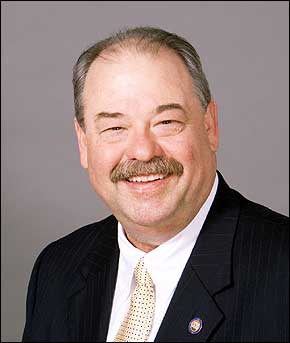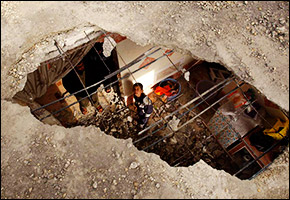John Elkington: The Phoenix Economy – a new paradigm for sustainable business
Welcome to Circle of Blue Radio’s series Five in 15, where we’re asking global thought leaders five questions in fifteen minutes, really, more or less. These are experts in journalism, science, communications design, technology, and water, and really everything in between. I’m J. Carl Ganter hosting this week.
‘From the ashes of the economic downturn a new Phoenix Economy is self-assembling focused on providing social and environmental solutions where markets and governments have failed.’ Those are words from the introduction of the new report The Phoenix Economy published by Volans the London and Singapore based consultancy.
In London for the Value Web This Moment in Time Workshop I’m joined by John Elkington founder of Volans and an author of the report. John has been a leader in developing new ways of making business sustainable and is widely credited with coining the term, ‘triple bottom-line’.
Well, John let’s start with The Phoenix Economy. Who’s rising from these ashes?
Early in 2009 we published a new report called The Phoenix Economy. The idea there is that the global economy is not just simply in recession, but it is going into one of the periodic, really profound, downturns that will be quite retracted, that will destroy many existing industries, that out of the ashes of the rubble will come a different order. One of the things that we’ve done is look around the world and to ask entrepreneurs, social and environmental entrepreneurs in particular, to nominate government agencies, major corporations, smaller social and environmental enterprises, that they think, in many ways, characterize that new emerging, or Phoenix Economy. We’ve picked fifty of those. The Phoenix Fifty, there’s a ranking of organizations within that report, are quite striking because they range from extraordinarily large companies, like Glasco Smith Kline and TNT, through to very very small organizations like APOPO International, which basically trains rats to go and find land mines. They’re not destroyed in the process; they’re so light that they don’t trigger the mines, so quite a spectrum.
Well The Phoenix among the Flames really evokes a pretty grim picture of where we are. So, what are some of the bright spots for this rare, but really gravely challenging moment in time?
One of the striking things for us in doing the survey was when we polled these entrepreneurs and thought leaders around the world was that the number one nomination, in terms of frequency of votes if you like, was the Obama presidency. I think one of the reasons for that is that people acknowledge that in these sort of times government, firstly, becomes more important, but that what we need is government as unusual. And I think what you see the Obama administration doing is setting very ambitious targets. For example, The New Energy for America plan and the state of California also came fairly high in the rankings. One of the reasons for that is that they tend to be a test bed for new regulations promoting new technologies. And I think at this moment in historical time it’s enormously important that we don’t simply ride this wave down and get into an enormously pessimistic gloomy mood, but that we begin to work out what is that we’re going to do. Not simply to reconstruct the old order, but to build a new economy and it has to be an economy that is going to work for not just the six and half plus billion people that are in the world at the moment that the nine to ten billion people who will be here by mid-century. I love looking back at the early years of aviation where most of the photographs that you see show aircraft that are crashed; sometimes unfortunately the pilots have been killed. That’s where we are now in all this. We’re going to have to try a lot of stuff very very fast. A lot of it will fail. We’ve got to learn from those failures very very fast. As that serious of experiments happens the more successful ones will coreless into new enterprises, new business models and I always remember the thing that Thomas Edison, who founded General Electric, said when he was in pursuit of the incandescent light bulb, “Now, at least I know ten thousands things that don’t work,” and then he got to the incandescent light bulb. We’ve got to fail a great deal.
So really, you’re saying we have to fail. Well, that means there are going to be many injuries along the way. What about optimism and ingenuity?
A lot of people see the prospect of an extended period of economic downturn as absolutely horrible cause for pessimism. I think all of that’s quite fair, but out of these periods of history we see convulsive change in a number of different ways. We’re already seeing it. One of the companies that is in the Phoenix Fifty is Glasco Smith Kline which has very recently announced that it’s going to radically reduce the cost of drugs exported to the developing world. And in terms of access to medicines that is a huge shift. It’s something that their competitors are going to be forced to respond to and in terms of things like HIV/AIDS, Malaria, Tuberculosis, some of the very big diseases that are becoming an increasing threat in many parts of the world. That sort of shift is enormously important. The key thing, though, is that this cannot simply be a citizenship response to those sorts of challenges. Increasingly, it’s got to be built into the fundamental business models that companies like GSK use. The fact that they’re seeing it that way is enormously encouraging.
So this metaphor is really familiar; the rebuilding after the disaster. So, take us a bit further into the thinking and really what’s next.
One of the extraordinary things as we started to talk about The Phoenix Economy is the recognition that we get. That people always feel that they’ve heard the phrase before and one of the reasons for that, I think, is the phoenix has been out there for a very long time; the sense of an old order going down and a new one being born. But, we’re much encouraged by that response and one of the things we’re planning to do next is to move from a Phoenix Fifty to a Phoenix Five Hundred and getting the change makers, the innovators, and the entrepreneurs themselves to help us develop the criteria against which we select the five hundred and also nominate the organizations and enterprises around the world that most excite. That’s where we’re headed next and I have to say it excites me a great deal.
John, tell me a little bit more about Volans and your board and the perspectives.
Early in history as Volans we formed an advisory board and two of the ten members I think illustrate the extraordinary challenge, but the extraordinary opportunity that we now face. One is Bunker Roy Barefoot College in India is somebody who operated right down in the, very much the grassroots level getting education to children who otherwise wouldn’t get it, who are actually turning into water or solar engineers is an extraordinarily exciting initiative Barefoot College, but at the completely other end of the spectrum is Jerry Leibinger who is one of these very rare creatures who is both an American Astronaut and also trained as a Cosmonaut in Russia and flew on both the Discovery and Atlantis shuttle missions, but then I think for about five months on the Russian Space Station MIR. And, again, just to show the connections that are starting to form in space Jerry is also very closely linked with and organization called Circle of Blue. When he was up in space he had one of these transformative experiences and many of these astronauts came back as semi-religious nutcases, he didn’t. He came back absolutely ceased with the notion that what we had to do was deal with environmental issues, but particularly water and what Circle of Blue currently do is create the media content which helps journalists and editors address what, still for many of them, is a somewhat remote issue. The 21st century is going to be full of challenges. Water is one of them, but I think at Volans what we’re trying to do is to signal with The Phoenix Economy and with the Phoenix Fifty and hopefully with the longer term Phoenix Five Hundred that there is huge hope out there, there is extraordinary individuals developing new technologies, new business models, completely new mindsets, we’ve got to identify them, find out where they’re doing what ever it is that they’re doing and add new ways to support them.
Thank you John. John Elkington is co-founder of Volans the London based consultancy funded by the Skoll Foundation that researches, in its words, ‘the great global divides that overshadow the future’. We’ve been in London at the workshop This Moment in Time to learn more about The Phoenix Economy and to find more articles and broadcasts on sustainability, water, design and policy, and related issues. Be sure to tune into Circle of Blue online at 99.198.125.162/~circl731.
Our theme is composed by Nadav Kahn and we’ve had support today from Traverse Legal. Join us again for Circle of Blue Radio’s Five in 15. I’m J. Carl Ganter.
Circle of Blue Radio is made possible with generous support from Traverse Legal.
Circle of Blue’s east coast correspondent based in New York. He specializes on water conflict and the water-food-energy nexus. He previously worked as a political risk analyst covering equatorial Africa’s energy sector, and sustainable development in sub-Saharan Africa. Contact: Cody.Pope@circleofblue.org








Leave a Reply
Want to join the discussion?Feel free to contribute!